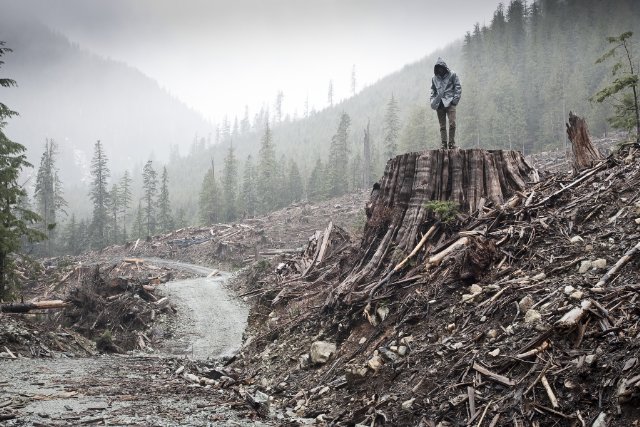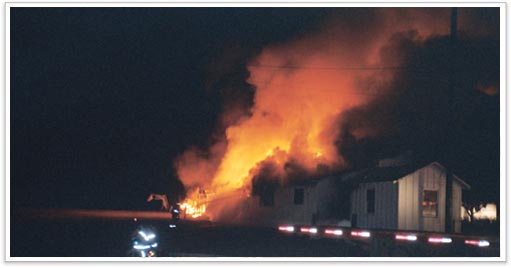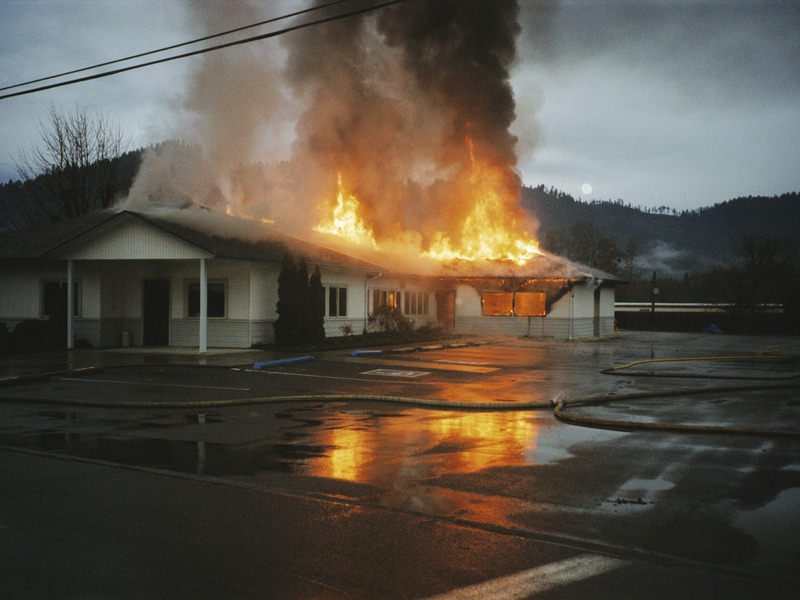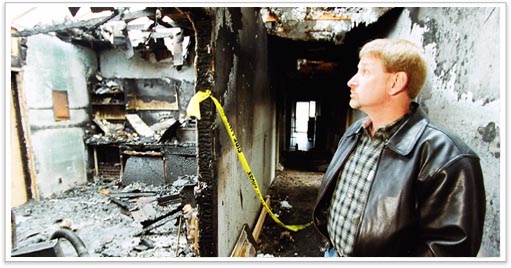You never know
where inspiration for a film will come from, but normally it does
not appear in the form of an FBI squad swooping into your wife’s
office to arrest one of her co-workers.
However, that was
exactly how filmmaker Marshall Curry and his co-director Sam Cullman
really came to learn about the Earth Liberation Front. The
co-worker was Daniel McGowan, a thirty-something New York native and
son of a policeman who joined in the group to protest
corporations that were destroying the
environment.
Eventually the
ELF became infamous when some of the more radical members convinced
other to take the law in their own hands and set afire
companies that were defiling the Earth. The fires became a pretty
big news story at the time, and yet the group still mostly flew
under the radar, up until the point that the law caught up with them.
“It’s surprising
to hear people’s reactions,” co-director Cullman admits. “Some
people had heard about them, but it seems like the majority of
people did not. As the number one domestic terror threat in the
United States, you’d think it would have more mass penetration.”
However, in the
eyes of the protestors, what they were doing wasn’t so much a
criminal act as it was a form of protest.
The product of
over four years of hard work, the documentary If a Tree Falls: A
Story of the Earth Liberation Front was released to critical
acclaim last summer. The film follows McGowan and other members of
the group, as well as members of law enforcement and some victims,
as they all negotiate the legal ramifications of the actions.
Now, months after
the film’s theatrical release, the filmmakers were recently happy to
learn that their film had been nominated for and Oscar for Best
Feature Documentary. “Yeah, it’s crazy news,” Cullman says
good-naturedly.
I was recently
able to sit down and speak with Curry and Cullman about their movie,
the Earth Liberation Front
and protest in America.
 You
say early on in the film that Daniel McGowan was arrested at your
wife’s office. At that time, was she... or were you... familiar with the
Earth Liberation Front. Did
either of you know anything about Mr. McGowan’s
role in it?
You
say early on in the film that Daniel McGowan was arrested at your
wife’s office. At that time, was she... or were you... familiar with the
Earth Liberation Front. Did
either of you know anything about Mr. McGowan’s
role in it?
Marshall Curry:
We
knew very little about the Earth Liberation Front. I’m sure
we read
the newspaper stories when the huge arsons at Vail happened and some
things like that, but we had no idea that Daniel was a part of it.
When did you come
to think that the ELF was an interesting subject for a film?
Sam Cullman:
I
think pretty immediately. Daniel was a great entry point into the
story, but I think the intersection of issues – not just the ELF’s
history, but the consequences of their actions and their ultimate
arrests – just touch on so much that is at stake in
America. Questions of environmentalism and terrorism and activism
itself.
With some current
groups out there like the Occupy movement and even at a different
extreme the tea partiers, do you feel like the story of the ELF is a
cautionary tale?
Marshall Curry:
Yeah, it’s been very interesting to see the emergence of the Occupy
movement. When the film was first theatrically released last
summer, it was kind of a historical film. I think a lot of people
thought, “Oh, isn’t that quaint that there used to be a protest
movement in the United States.” When the Occupy activity started,
it was pretty remarkable to see history start to seem like it was
repeating itself – both with civil disobedience and some of these
actions happening and also with the police response, using pepper
spray on people. So, we do feel like the movie is a cautionary tale
for activists to think carefully about their tactics and the ethics
and the legal consequences and the effectiveness of different
tactics. Also, it’s a cautionary tale to the government to think
about how they react, because I think some reactions – like pepper
spraying people who are involved in non-violent civil disobedience –
radicalized people. It pushed them towards doing things like the
Earth Liberation Front, while other responses bring people into the
democratic argument.
Obviously many of
the occurrences in the film were big news stories long before you
got involved – particularly the Battle of Seattle. How many of
these things had you heard about or even followed before deciding to
make the film?
Marshall Curry:
We
knew about them. We follow the news pretty well and are
relatively politically aware. So we had some background. But,
definitely the process of making the movie took us into these
stories at a much deeper level.
 I’m
not going to lie; I had kind of conflicting feelings about the
group. I do strongly believe in many of their causes and at the
same time I couldn’t help but think that they did eventually go over
the line with some of their ways of handling things. As filmmakers,
was it hard to stay impartial about everything as you were learning
about what happened?
I’m
not going to lie; I had kind of conflicting feelings about the
group. I do strongly believe in many of their causes and at the
same time I couldn’t help but think that they did eventually go over
the line with some of their ways of handling things. As filmmakers,
was it hard to stay impartial about everything as you were learning
about what happened?
Marshall Curry:
I
think it was less a question of impartiality and that sort of thing
as much as responding to the story that was presented to us.
Everywhere that we turned along the process of making this film –
talking to people involved in the arsons and the detectives and the
victims – people just sort of surprised us. When we first started
making this film, the general media environment discussing these
issues was really, really polarized. Cops as pigs and
environmentalists as wayward hippies and industry as gluttons – it
just seemed that things had gotten into such extremes that nobody
was really getting into nuance. Then when we talked to the actual
people involved, there really was a ton of nuance there. So we felt
compelled to reflect that complexity in the film itself.
Once you started
looking back at them in an almost investigative way and knowing some
of the people involved and some of their reasons, how did it change
your understanding of the events?
Sam Cullman:
Well, I think it just opened up a complexity. You can caricature
people when you don’t know them, but once you spend time with
somebody like Daniel McGowan, you start to understand. Which is not
the same thing as saying you agree with or you condone. But you
start to understand some of the things that led him to do these
fires. Similarly, once you spend time with the detective on the
case or the arson victims, you start to understand them as real
people, who, in the case of Steve Swanson, actually suffered as a
result of these fires. They were not victimless fires. So, I think
that getting to know the human side of this story, as opposed to the
purely political side of this story, gave us a much more nuanced and
much deeper understanding of the whole thing.
Daniel McGowan
certainly did not seem the type to become involved with something
like this. Were you rather shocked by how varied the people who
ended up being a part of the movement?
Sam Cullman:
Yeah, absolutely. One of the things that is true about this film is
that we call it “A Story of the Earth Liberation Front.” It’s “a
story” because there were 20 people caught up in this particular
group of arsons and people who were in this investigation.
Everyone’s stories and backgrounds were very different. That said,
there are some commonalities and I think Daniel’s story in some ways
speaks to some of that. This general frustration with the process
of making change and how slow change can be and how difficult change
can be. Then this point – which for everyone is different – at
which they turn and decide to cross the line and take on arson as a
means and a tactic to move forward.
 The
film was made in conjunction with a lot of the court cases, and
several people that you were talking to were going in and out of
jail during that time. How did that complicate the making of the
movie?
The
film was made in conjunction with a lot of the court cases, and
several people that you were talking to were going in and out of
jail during that time. How did that complicate the making of the
movie?
Marshall Curry:
I think it raised the stakes a bit for people. There was a lot of
stress for people during that time. Getting access was probably the
most difficult part of the process. The activists, some of whom
were facing life in prison, were reluctant to talk to somebody who
they didn’t know. They were afraid that we would do what the media
always did, which is caricature them as hippie terrorists. I think
that the prosecutor and the arson victims also were a little
reluctant to talk to us. They had cases that were going on and were
worried that maybe we would edit what they said out of context.
That we had some environmentalist agenda and we would try to make
them look bad. So we had to spend a lot of time explaining to
people that we were really interested in their points of view and
that we wanted the movie to show people’s best arguments banging
against each other, rather than setting up straw men and knocking
them down.
Were there any
people involved who you could not get access to or only get less
than you would have liked? For example, while you did speak with
Jake Ferguson, for a long part of the movie he was just a shadowy
figure and I was a bit surprised there was not more footage of him
speaking out about his role in the events.
Marshall Curry:
Actually, it’s funny that you mentioned him. He was someone that we
spent a lot of time trying to get access to. I was able to get his
lawyer to agree that he should talk to us. At one point, we had a
conversation set up and then he sort of flaked on it. Ultimately,
he did an interview with some folks in a TV station and the result
of that was really negative in the activist community, so he decided
he wasn’t going to do any more interviews after that. We actually
were not able to get an interview with him. The footage that you
see in the movie are outtakes from another interview that he had
done. Fortunately the interview was the same basic questions that
we would have been asking him. But that was one that we weren’t
able to get.
Not speaking as a
filmmaker, but just as a citizen now, in a country where a large
percentage of the population refuses to even see that the state of
ecology as a problem, do you feel that sometimes extreme measures
are necessary?
Sam Cullman:
I think that’s definitely a central question in our film. To speak
as citizens versus filmmakers, I don’t know. But I do know that I
do think that we need to be confronting these issues. If
there is a moral out of this in particular:
arson is probably not a very effective way of getting your point
across. With the experience of the ELF, it may have gotten
into our consciousness – which I think is something that they wanted
– but certainly, it also had a lot of negative
repercussions. Not just for the people who were victims, but also
for the movement itself. You look at movements today, whether they
are based around issues like climate change or otherwise, it has to
be about coalition building and it has to be about bringing people
into a movement. When things are born out of frustration or born
out of a very small group, the chances of affecting change is very
difficult. So, I do think that the lessons of the story are ones
that we can draw from.
 With
the political climate more divided today than it has been perhaps in
any time in American history, do you think that it is even possible
to change people’s minds on what happened, or will people just go in
with preconceived notions and seize on the points that support their
views?
With
the political climate more divided today than it has been perhaps in
any time in American history, do you think that it is even possible
to change people’s minds on what happened, or will people just go in
with preconceived notions and seize on the points that support their
views?
Sam Cullman:
Look at Occupy, right? The conversation has shifted because of what
they did and what they brought to the table in just four months in
the United States. There’s many ways of injecting your voice into a
public debate. It is not impossible. It’s difficult, but it’s not
impossible.
In a lot of ways,
the Occupy protestors were an outshoot of earlier hippie protests,
not completely, but mostly peaceful. Is it possible to just have a
peaceful protest at this juncture in history and make that kind of a
difference?
Marshall Curry:
Yeah, I feel like the Occupy movement is a sterling example of
that. I saw an article recently that was analyzing the number of
times that The New York Times used the words “income
disparity” in the year before the Occupy movement and since. It was
something like a 10,000% increase. I’m sure that if you analyzed
the number of speeches on Capitol Hill and the number of times that
this idea now has become a mainstream point for people to consider –
that is a direct result of non-violent civil disobedience.
One of the great
ironies of the group – and of course the movie – was that the people
who stayed most faithful to the ideals of the group were punished
the most, while other members who may have been more involved in the
criminal protests were able to get off easier by informing on their
fellow members. Did it surprise you that some of the most active
members of ELF seemed to jettison their beliefs when it became
obvious that it was in their self-interest to do so?
Sam Cullman:
Yeah,
I think it was, among other tragedies, a certain piece of
tragedy in this story, to hear that this group that had had
passionate solidarity ultimately betrayed each other, many of them,
along the way. But it’s not surprising that these things happen.
If we look at the federal incarceration numbers, something like 90%
of people end up pleaing out. Only very small fractions end up
going to trial, because power is very often in the hands of the
prosecution. I think that maybe their choices were as much of a
reflection of that as anything else.
A great deal of
the debate on the ELF which was discussed in the film is whether or
not the Front was a terrorist group or if it was just a protest
group. Obviously, as documentarians you can’t really choose sides,
but just as concerned citizens do you feel that Daniel McGowan and
some of his cohorts got a raw deal or do you think what they did
might have come within the definition of “terrorism?”
Marshall Curry:
We see it as a somewhat complicated issue. The folks whose
businesses were burned – they were certainly terrorized. They got
alarm systems for their homes. They didn’t know if their homes were
going to be attacked, if their car was going to burst into flames
when they got into it. So, if your definition of terrorism is
“somebody who uses intimidation to force you to do something or not
do something,” then there is an argument that these fires would
qualify. Now, the folks who are more supportive or sympathetic of
the ELF point out that no one has ever been harmed in any of these
arsons. These things are more like the Boston Tea Party.
They are symbolic property destruction and shouldn’t qualify at
all. I would say in the end, probably Sam and I are closest to the
police captain who says in the film that one person’s terrorist is
another person’s freedom fighter and he’d rather just focus on crime
and not crime. If you commit an arson, that is a crime and the
government should try to catch you and put you in jail and stop
people from committing arson. Whether it is terrorism or not is
maybe not even a helpful question. Terrorism might be one of those
words that creates more heat than light. It excites people and
generates a lot of emotion, but without clarifying what it is that
we are talking about.
Sam Cullman:
I think that it is sort of instructive for sure to know that the
federal government has differing definitions of what terrorism is,
even within itself in the United States. You look at a body like
the UN that has been struggling to define this for decades, with no
results. I think the reason for that is quite clear. The message
is that this is a potentially very subjective term that can be
wielded to differentiate positions of who is in power and who is at
the other end of power. I think there is a danger in that.
How did you find
out that you were nominated for an Oscar and what was that
experience like? Was it gratifying to see your hard work honored in
such a way?
Marshall Curry:
Sure. I mean it’s a huge thrill. I’ve got two kids, a five year
old and a seven year old. I was in the kindergarten class helping
my son hang up his jacket when my cell phone in my pocket started to
ring. That’s how I got the news.
Sam Cullman:
I was the Sundance Film Festival, showing a different film that I
had produced and shot. Getting the news out there was especially
thrilling, absolutely.
What do you have
coming next?
Marshall Curry:
I have a film that I’ve started shooting about Lennox Lewis, the
former heavyweight boxing champion. He retired about six years
ago. Now he’s 47 or so and he’s got 40 more years of living and is
trying to figure out what to do. When you’ve worked your whole life
to achieve something and you’ve achieved it, how do you make sense
of it? What do you do for your next chapter?
Sam Cullman:
I’ve been shooting a film for the last few months about an art
forger in the United States – someone who has been forging art for
30 years and donating it to museums and institutions and has just
recently been caught.
Email
us Let us know what you
think.